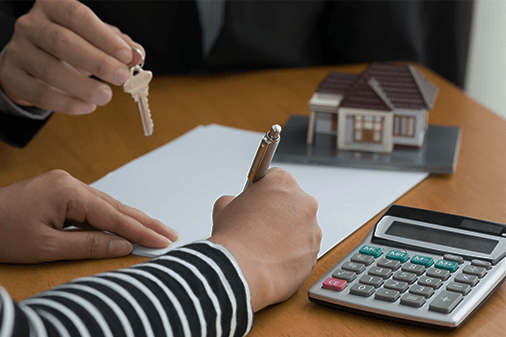In this article
Check your credit score today
Check your score and get tips to improve it. It’s free, forever.
What credit score do you need to buy a house
What's the required credit score for a home loan? Find out here.

In this article
Check your credit score today
Check your score and get tips to improve it. It’s free, forever.
What credit score do I need for a home loan? This is a question that plagues every borrower as soon as they start looking for a home loan to purchase their dream house.
Credit scores help lenders assess the creditworthiness of borrowers and evaluate their lending risk. And here’s everything you need to know about minimum credit score for home loan in Australia.
It is difficult to point out the exact credit score needed for home loan as lenders seldom make that information public. Moreover, different credit rating bodies use different models to compute the score, making it difficult to single out one score.
But if you are still keen to know what credit score do you need for a home loan, here’s what you should consider as a benchmark. While it doesn’t tell you what is the exact credit score to get a mortgage is, it gives you an idea of how lenders view your current score:
Scores below 509
This is a below-average score, and you will be classified as a high-risk borrower. Most lenders may not be agreeable to approving your loan application. Even if you find a lender, you may be charged significantly high interest.
Scores between 510 and 621
This would be considered an average score. Even though it may signal some negative remarks in your credit report, you may still have a chance to get approved for a home loan.
Scores between 622 to 725
This is considered to be a good score by most lenders/ Your chances of getting approved for a loan are fairly high and you may also be able to get it at a lower interest rate.
Scores between 726 to 832
This is a very good score, placing you right into the league of very creditworthy borrowers of Australia. Most lenders will approve your loan application at impressive terms.
Scores 833 to 1200
This is an excellent score and makes you an extremely creditworthy borrower. Your chances of defaulting on the loan are minimal. You will enjoy significant negotiating power, and lenders may agree to give you the loan at a much lower interest rate.
Getting home loan at competitive rates depends a lot on your credit score, as lenders use it to assess your risk profile. The better your credit score, the lower your chances of defaulting on the loan, making it easier for lenders to offer a cheaper rate. On the other hand, if your credit score is less than perfect, you are more likely to default. To protect their lending risk, lenders are likely to charge a higher interest.
However, getting the best interest rate also depends on your debt-to-income ratio. If you are over-leveraged, the lender may still charge a higher interest rate to reduce the lending risk.
A low credit score rating doesn’t mean that you won’t be approved for a home loan. In fact, there are several lenders in the market specialising in bad credit home loans. But that doesn’t mean that you should get a home loan with a low credit score or not take steps to improve your score because you will still get approved.
A low credit score can mean a significantly higher interest rate, costing you tens of thousands of dollars over the life of the loan. The lender may also impose additional conditions to minimise their risk.
There is no straight answer to the minimum credit score to buy a house. It is the same as wondering what credit score do I need for a credit card -- there’s no magic number that guarantees approval of any credit product.
Getting credit score can indicate where you stand and how likely it is for lenders to approve your application. The credit rating needed for a mortgage varies depending on which lender you are approaching. Apart from home loan credit score, lenders also consider other factors to assess your unique borrowing profile before deciding on your loan application.
In certain cases, the credit score for mortgage may also vary depending on the type of mortgage you are applying for. For instance, the credit score requirement for home loans for seniors and conventional loans may not be the same. Lenders providing reverse mortgage options may not even use credit scores to determine eligibility. Higher home loan ratings may be only available to borrowers with very good or excellent scores.
Usually, borrowers applying for conventional home loans have a better chance of getting approved if their credit score is between 600 to 700. While a high credit score provides you more power to negotiate with lenders, it is still not a guarantee of a low-interest rate. In fact, interest rates are subject to several external factors, including the size of your loan, your outstanding debt obligations, and the rate decided by the central bank.
Apart from credit score for home loan in Australia, here are some other factors that are considered when you apply for a mortgage:
Debt-to-income ratio
This ratio, expressed as a percentage, indicates whether your monthly income is sufficient to meet your current debt obligations. The lower it is, the better your chances of getting approved. Lenders use it to understand whether you are in a position to service additional debt.
Loan-to-value ratio (LTV)
This is the ratio between the loan amount the lender will provide to the property's value. It helps to assess the risk involved in secured lending. An LTV of 80 percent or less is ideal and makes you a less risky borrower. A high LTV ratio means the lender may charge higher interest on the loan.
Employment history
Lenders examine the employment history to check whether the borrower has a steady source of income. This indicates their ability to repay the loan on time. In case you are not a full-time employee, lenders may ask you to furnish other details to show that you can afford the monthly instalments.
Record of assets
Other assets you own, such as investments, property, cash savings, and retirement accounts, are also considered. Lenders want to ensure that you have an alternate source to make payments in case you lose your primary source of income.
Struggling with a bad credit score? Wondering how to get pre-approved for a home loan?
Consider these tips for improving your credit score before you apply:
Fix errors in your credit report
Sometimes credit rating bodies record erroneous information, especially about repayment history, which can bring your score down.
Make sure to check your report thoroughly to identify the errors and raise a dispute with the lender/credit rating body to get the information updated.
Don’t allow your credit cards to sit idly
Extended periods of inactivity can result in the lender closing your credit card account. It reduces the available credit limit and increases your credit utilisation ratio, which brings down your credit score. So keep charging your card occasionally and pay off the dues on time.
Pay down other debts
One of the easiest ways to improve your credit score for a home loan is by paying off existing debts, which improves your debt-to-income ratio. Additionally, it positively impacts the credit utilisation rate -- the lower your rate, the better you appear as a potential borrower.
Here are some tips for pulling up your credit score required for home loan:
Don’t apply for additional credit
Whenever you apply for any credit, the lender runs a credit check through the credit reporting bodies and pulls out your file. These count as hard inquiries and can lower your score by a few points. It can be especially damaging if there are multiple hard inquiries within a very short period. It also signals to other lenders that you are not efficient at managing your debt and that’s why you continuously need to keep borrowing.
Wait and apply again
If your credit score is dangerously low, you should put off applying for a home loan until your score improves. Make sure to pay off your debt obligations and not borrow any new loan till you have a more positive credit history.
Applying for a new debt when your existing score is already low can lead lenders to reject your application. Moreover, if your credit report records bankruptcy or collection accounts, your score can take even longer to improve.
If the home loan was declined, when can I apply again? Note that your mortgage application and its rejection will be recorded as part of the credit history. Don’t rush to reapply immediately, as multiple applications can bring down your score. Try to understand the reason for rejection -- if it was rejected on account of a low credit score, don’t reapply till your score goes up.
To summarise, it is hard to pinpoint a minimum credit score for a home loan. While credit score is certainly an important factor considered by lenders to decide on loan applications, it is not the only one considered. Take the necessary steps to avoid ending up with a high risk credit score.
Sign up with ClearScore to check credit score and get free credit reports.
Doug loves to work with lenders to get ClearScore users the best deals
